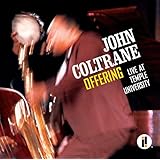 Because of the trajectory of his musical/spiritual career, John Coltrane’s premature death in 1967 evokes the same questions as the Kennedy and Lincoln assassinations: What would their careers have been like if they had lived a longer life, and how would it have affected the future? People have argued for decades about the Vietnam War and Reconstruction in regards to the two presidents, and in the same vein, there has been much discussion as to the life and the wake of John Coltrane’s ascension and career. This 2 cd from November 11, 1966 in his hometown of Philadelphia PA is the last testament of Mr. Coltrane, and in many ways it asks more questions than it answers. It’s a concert that is only 8 months before his death, and is light years beyond what he was doing just a few years previously. It’s implications are going to be dissected for years. Happy hunting!
Because of the trajectory of his musical/spiritual career, John Coltrane’s premature death in 1967 evokes the same questions as the Kennedy and Lincoln assassinations: What would their careers have been like if they had lived a longer life, and how would it have affected the future? People have argued for decades about the Vietnam War and Reconstruction in regards to the two presidents, and in the same vein, there has been much discussion as to the life and the wake of John Coltrane’s ascension and career. This 2 cd from November 11, 1966 in his hometown of Philadelphia PA is the last testament of Mr. Coltrane, and in many ways it asks more questions than it answers. It’s a concert that is only 8 months before his death, and is light years beyond what he was doing just a few years previously. It’s implications are going to be dissected for years. Happy hunting!
At this stage, long gone is the famed “Classic Quartet” team of Tyner, Jones and Garrison. On this stage Alice Coltrane is at the keyboards, Rashied Ali on drums, Pharoah Sanders comes along on tenor and Sonny Johnson sits in on bass. However, due to Coltrane’s vision of world wide music, he is quite ecumenical at this gig, allowing just about anyone with an instrument to join up on with the band and play. So, you get along with a slew of percussionists, alto saxists like Arnold Joyner and an 18 year old Steve Knobloch getting their one chance at the spotlight and raising quite a few eyebrows on “My Favorite Things.” Besides that is the famed take of “Leo” that has not only Sanders and Coltrane frenetically opening up the piece, but the leader gets to the point where (as they say in Oklahoma) he’s “taken it as far as it’ll go” had starts vocalizing/singing as if that’s the only way the music could continue. People have and will continue to conjecture about this moment like a piece of papyrus in the Dead Sea Scrolls.
Besides that, you have Alice Coltrane delivering some astonishing bop chops on the 23 minute take of “My Favorite Things, “ and Sanders is both exciting and cogent on “Leo” and “Naima” and the overwhelming intensity of these pieces is something to be felt more than heard. As for Coltrane’s playing, his arpeggios feel like he’s reaching for something just beyond his grasp, and the take of “Crescent” here is up there among his best. Each song, however, shouldn’t be dissected in and of itself, but more likely considered as part of an organic whole, as the music comes across as a visceral experience to absorb and participate in. On a side note, a friend of mine who is a Coltrane fan saw this band around the same time and said that the music was so overwhelming that he almost felt like throwing up. He wasn’t referring to the quality of the music, but rather its intensity.
As to the sound quality of the recording; Well, there have been bootlegs of this out there, and the engineers here have done a yeoman’s job of making the music as clear as it is. Because of the placement of the microphone for the pickup, you get a lot of horn, but not as much from the drums/percussion. The take of “Naima” is not a complete version, but at 16 minutes, you get a mouthful. Having said all of this, let it be known that this is not a place you should start if you’re wanting to figure out what the excitement and influence of John Coltrane is all about. My first Coltrane disc was Meditations and I immediately had to return it for something better suited for a neophyte. For that, go to Giant Steps, Impressions and A Love Supreme. But if you are a fan that thinks the last couple of years were the last bright shining lights of when jazz and a pilgrim’s spiritual journey could coalesce, you’ll find a lot to like here, at least for one listen. Will you go back to it 20 times like Giant Steps? As Mark Twain once said, “A ‘classic’ is something that you want to have read.”
Impulse! Records
Resonance Records